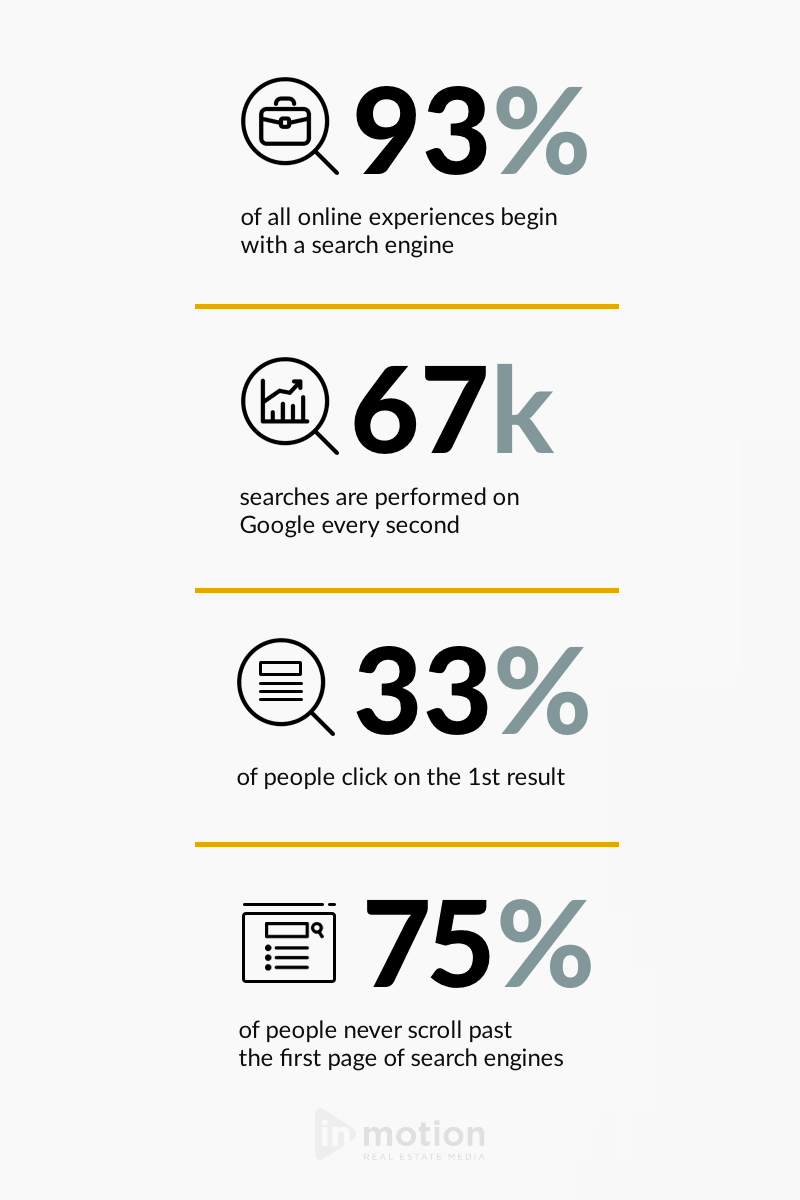6 Real Estate SEO Tips to Maximize Your Google Visibility
SEO visibility is increasingly more important in commercial real estate as more buyers and tenants leverage Google to research properties.
If you want potential prospects to find your CRE firm or discover your property listings, then you need to leverage online marketing strategies to get ahead. Investing in SEO is one of the many tools that can help give a commercial real estate company gain a crucial competitive advantage in 2020 to stay ahead of the curve.
What is SEO?
SEO, or Search Engine Optimization, refers the practice of creating visibility and improving rankings in Google and other search engines for your company or property listings.
SEO is a long game that requires time to strategize and implement, as it can take months or over a year to see significant results; however, when it is executed correctly, the outcome can be powerful and help increase the numbers of visitors and new prospects for your website.
Why is SEO for real estate important?

Achieving top rankings in search engines is crucial for any effective online marketing strategy. Research shows that when you run a search query on Google, the 1st result gets 33% of the clicks. Furthermore, out of the 67K searches performed on Google every second, 75% of people never scroll past the first page of search engine results.
In other words, ranking for relevant keywords on the first page of Google search results is imperative to achieve any kind of meaningful impact and drive more potential tenants, investors, and brokers to your real estate website to beat your competitors.
Here are 5 ways to optimize your CRE website to boost SEO visibility:
Step 1 – Define Basic Keyword Strategy
Having a basic strategy for keywords you want to target is a good starting point for any SEO strategy. You can consider segmenting your keywords into “buckets” or categories such as:
- Generic competitive terms (head keywords)
Competitive generic terms like “1031 exchange” or “miami office” and other general variations a user would search for. - Specific niche terms (longtail keywords)
Keywords that relate to specific categories your property or CRE company would fall into. These are usually more descriptive, such as “houston class A office space for rent” or “boston retail brokers”. - Branded terms
Any keyword term that uses your company brand or property name. You’ll want to ensure your site does enough to outrank all the CRE listing sites that might already have your property listed.
Covering this spectrum of keyword segments will help dictate how to define your content.
Step 2 – Write High-Quality, Unique Content
Content quality is the core and critical driver for SEO performance.
Make sure you have a wealth of unique and helpful content displayed throughout your site to create a foundation for a strong SEO strategy. Keep in mind that not all content has to be text-based and you may want to consider other mediums to utilize such as images, graphics and video.
Unique content for a CRE site can come in many shapes and forms such as:
- In-depth company overview
- Unique property descriptions
- Relevant industry reports and research
- Original news articles
- Company updates and recent transactions
Many commercial real estate companies will reuse the same (or close to the same) content or cover the bare minimum. For example, it’s common to see the exact same property descriptions reused over-and-over for multiple published property listings. The more optimal approach is to create detailed and unique property description for the site you want to optimize and rank for SEO.
Step 3 – Optimize On-page SEO Elements
Every page of a commercial real estate website has important SEO elements associated with it. Specifically, the page title, the site description, and even pictures have meta data that are used by Google to understand the overall content of the page. It is imperative to utilize these informational building blocks to help Google place your site into the relevant searches and get your site listed correctly.
- Page Title
More often than not, this will be your company name truncated with a simple description of what you do or where you operate. Here are a couple templates of simple, yet effective page titles: “(State and/ or City) Commercial Real Estate I Company Name” or “Company Name I (State and/ or City) Retail Brokers”. - Meta Description
This is a more elaborate description of the page title and the company. As good practice, it is best to keep it within 120-158 characters. Within that description it is important to focus on the geographic area where your CRE company operates, as well as what specific services are rendered as target keywords, i.e. tenant representation, retail brokerage, multifamily acquisition, etc. - Optimized images
It is essential to label every picture correctly and descriptively using appropriate file names and ALT tags. Why? 63% of people who look at Google images will then go to the host website, 17% of that traffic belongs to the first image. Images also have a higher CTR (Click-through Rate), and users are twice as likely to scroll down the page of image results than with traditional text results.
Google rewards companies for creating content, especially relevant content, so make sure everything is correctly labeled.
Step 4 – Find Ways to Get Backlinks
One surefire way to improve rankings for your website is by getting other authoritative websites to link back to you. This was a key success factor for SEO 10 years ago and it is still crucial today.
Getting links is a more advanced step for SEO, as it is not entirely within your hands. It requires solid, consistent content, and diligent outreach.
This is where creating helpful and engaging content is paramount, as people will not be compelled to link to your website if there isn’t something interesting or relevant to write about and share. Updating your website with new items about recent acquisitions, or creating CRE reports of the market status in your area (for example) are content pieces that people will want to share.
Simply creating the content is not quite enough. The next step is to do research in order to acquire the proper contact information for media sources you deem relevant. Once you have emails or other contact information you have to be politely persistent with outreach to get press contacts and other websites to link back to you and / or publish your news.
If a reliable contact is established, it is good to maintain that relationship and continue supplying valuable news to them. There is a mutually beneficial side to all of this, as while you are getting links to your commercial real estate company and building brand awareness, the media source is acquiring information and content with relative ease. It’s a true win-win situation.
Step 5 – Improve Page Performance
Site speed has become increasingly more important because Google will actually rank sites lower if they don’t perform well or have subpar page load speeds.
There are many factors that determine and affect page load speed: hosting servers, content on the page, image sizes, compression of the code (HTML, JavaScript, CSS, etc), optimization of the website.
Google provides a great resource to get started and some tips for what can be improved for your CRE website: https://developers.google.com/speed/pagespeed/insights/
There are some other page speed checkers available online, and they can all provide a list of actionable items to address. Some of the possible items can be resolved without having any website development skills; however, others require a web developer to fix them and make sure the site runs as smoothly as possible.
Step 6 – Get a SSL Certificate
A quick and easy step to help your company’s commercial real estate website SEO is with an SSL certificate. Essentially, it is a cryptographic data file that is used to protect the information of a site visitor from being compromised. It ensures that the data submitted to your website is only visible to your server from the visitor.
This security measure became particularly important due to the rise of E-commerce and online retail. People submit their credit card information and credentials much more readily now than even a few years ago. In fact sales online are projected to reach $27 trillion by 2020.
While you may not have any e-commerce online, it’s become an industry standard to acquire and have an SSL certificate on your CRE website. SSL certificates are generally provided by your domain host for an additional fee (GoDaddy, etc). However, there are also alternative options available by doing a quick search.
Conclusion
These are some of the steps to help with your real estate website’s SEO. Even the best commercial real estate websites heavily rely on SEO and understand it is a dynamic marketing channel that constantly changes. Google and other search engines are relying more on AI and automatic algorithms to perpetually learn from search behavior and evolve. They are trying to create the best possible product, and ultimately ensure that people use their platform to get the answers they seek.
When you are creating your company website or revamping it, try to think like the very people that are your clients. What are the words they use to describe your services? How did they find your company or property listing initially? This will help define keywords to target, content to create, and ultimately provide the best possible results for your company’s online presence.



